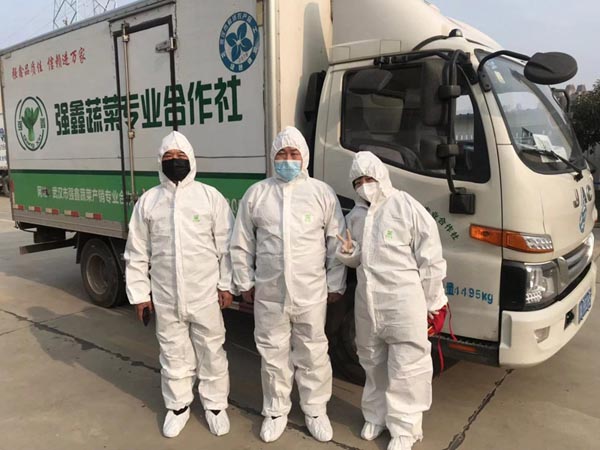

Li Zhifang (middle) and his colleagues make sure that a continuous supply of fresh produce arrive at markets in Wuhan, Hubei province, during the city's lockdown due to the COVID-19 outbreak. [Photo provided to China Daily]
UN Food Hero, who gets farmers a fair price, ensured fresh supplies in Wuhan during lockdown, Li Yingxue and Liu Kun report.
On Oct 16, World Food Day, the Food and Agriculture Organization of the United Nations revealed 26 Food Heroes, who, no matter what the circumstances, continue to provide food to their communities and beyond-helping to grow, nourish and sustain our world.
Li Zhifang, 44, marketing manager of Wuhan Qiangxin Vegetable Production and Marketing Cooperative, was the only hero from China.
Li learned about the news on the afternoon of Oct 15 from his niece who is majoring in English in college.
"I was on a business trip in Changyang, Hubei province, when she called me and translated the news to me. I was thrilled. How could the United Nations know my story? I didn't even know where the United Nations is located," he recalls.
A Wuhan local, Li used to do quality control on honey produced in his village. He has also cultivated crayfish and worked in the construction industry.
In 2012, he went back to his hometown Dongxihu district in Wuhan and joined Wuhan Qiangxin Vegetable Production and Marketing Cooperative. He has been dealing with farmers and their produce ever since.
In 2018, he started to do contracted farming-that involves growing produce to order-with Alibaba's fresh food chain store Freshippo, also known as Hema Xiansheng, and his main task is to balance and fix the prices to match market value fluctuations.
"We buy vegetables from farmers at a relatively stable price, and we provide the vegetables to Hema at a stable price, so that the farmers can have an ensured income despite drought or excessive rain," Li explains.
"For example, when the market quotation for a kilogram of a specific vegetable is lower than 1 yuan ($0.15), we purchase from farmers at the price of 1.5 yuan per kilo. But if the price rises to 3 yuan or higher, the purchase price rises with it to around 2.2 yuan.
"That's my understanding of modern farming, and maybe that's why the UN gave me this honor."